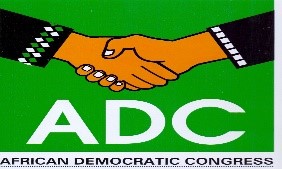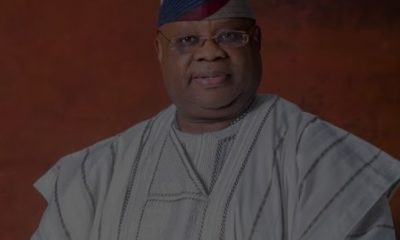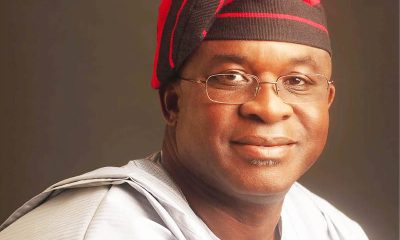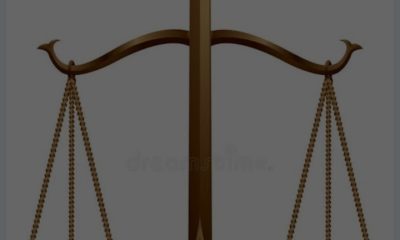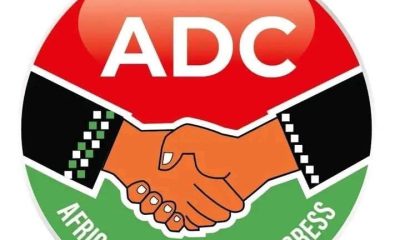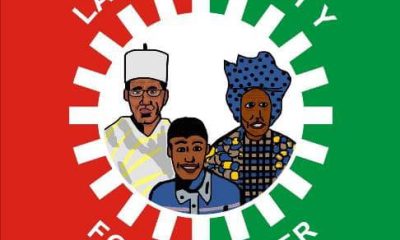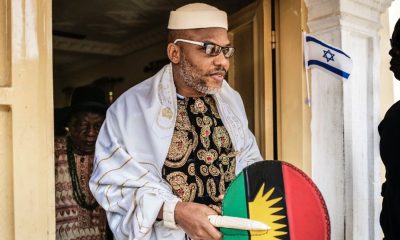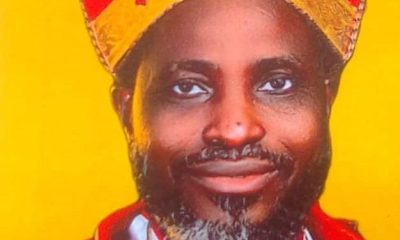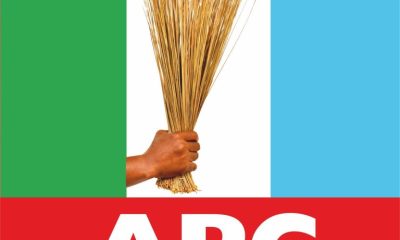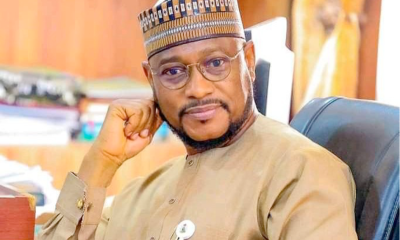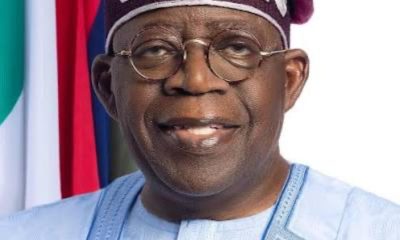Politics
Nigeria Is Sliding Towards Lawlessness, Anarchy, Says Sen. Ewhrudjakpo …As Varsity Honours Bayelsa Deputy Governor

By David Owei, Baylesa
The Deputy Governor of Bayelsa State, Senator Lawrence Ewhrudjakpo, has said Nigeria does not qualify to address itself as a democratic society in view of the brazen manner the country’s leaders and institutions show disrespect for the rule of law.
The Deputy Governor made the assertion on Wednesday when a high-powered delegation from the Law Faculty of the Niger Delta University (NDU), led by the Vice Chancellor, Prof. Allen Agih, paid him a courtesy in Government House, Yenagoa.
Senator Ewhrudjakpo, who said “Nigeria is not a democratic society but merely wearing the toga of democracy,” emphasized that “once the rule of law is not respected, then there is invariably no democratic system.”
In a statement issued by his Senior Special Assistant on Media, Mr Doubara Atasi, the Bayelsa Number Two Citizen, expressed worry that if the present trend of flagrant abuse of political power continues unabated, the country would slide into total anarchy and chaos.
According to him, the main problem of contemporary Nigerian society is that those who have the opportunity to turn things around for the good of majority of the people, fail to do so because of greed and lack of selfless patriotism.
Senator Ewhrudjakpo, who paid tribute to the late Jimmy Carter, a former president of the United States, for his contributions towards healthcare and democratic entrenchment in Africa, lamented how deliberate steps were being taken to destroy democracy in Nigeria.
He, however, applauded Alhaji Aliko Dangote and a few other Nigerians who are using their foundations to give back to society, especially in the area of providing free health services to the citizenry.
His words: “Nobody should be under any illusion that Nigeria is a democratic society. No, we are not a democratic society.
“We are merely wearing the toga of civilians, but there is no true democracy in this country, as far as I am concerned. In a democracy, the rule of law becomes the ultimate.
“Once the Rule of Law is not there, then there is no democratic system, and we are sliding towards the period of brute life, anarchy and chaos. That is the way we see it from the angle of the law.
“I believe that in our society today, those who have don’t give what they have to build society. Rather, what they do is to take more from society which has made them what they are. Apart from Dangote and are few others, most people don’t give back to our society.
“For me, I believe that at this stage of my life, I owe society; Society no longer owes me. That is my modus operandi and motivation. So whatever I can do to sacrifice to society, that is what I’m doing.”
The Deputy Governor, who thanked the NDU delegation for recognising his modest contribution towards the advancement of the Law Faculty and the university in general, urged them to give a greater honour to the governor, who is the visitor to the institution.
Responding to their requests, he promised that government would address the issues of hostel accommodation and expanding the e-library project for the faculty before the next accreditation visit of the National Universities Commission (NUC) and Council for Legal Education.
Speaking earlier, the Vice Chancellor of the Niger Delta University, Professor Allen Agih, said the visit was primarily to appreciate the Deputy Governor for his unquantifiable support to the University, especially its Faculty of Law, adding that his personal sacrifice in lecturing law students of the university would not go unrewarded.
Acting Dean of the Faculty of Law, NDU, Dr. Gogo Otuturu, also applauded Senator Ewhrudjakpo for creating time out of his tight schedule to handle three different law courses.
Dr. Otuturu said government needed to address some infrastructural challenges at the Law Faculty, namely a befitting Faculty building, hostel facilities for male and female students, extension of the solarization project, as well as expansion of the e-library.
Highpoint of the visit was the presentation of a Certificate of Appreciation by the NDU Vice Chancellor, Prof. Allen Agih, to the Deputy Governor in recognition of his immense intellectual and sacrificial contributions towards the development of the faculty of law and the university
The NDU delegation included the Head of Department, Private and Property Law, Prof. Felix Eboibi, the Head of Department Jurisprudence Law, Dr. Kelvin Bribena, and Professor of Oil and Gas Law, Prof. Damfebo Derri.
Others were the Facility Examinations Officer, Dr. Richard Ogbe, the Personal Assistant to the Vice Chancellor, Dr Emmanuel Amagbe and the Faculty Officer, Mr Kehinde Slaboh.
Politics
Prioritize welfare and security of Nierians not 2027 politics, LP Reps tell Tinubu, APC
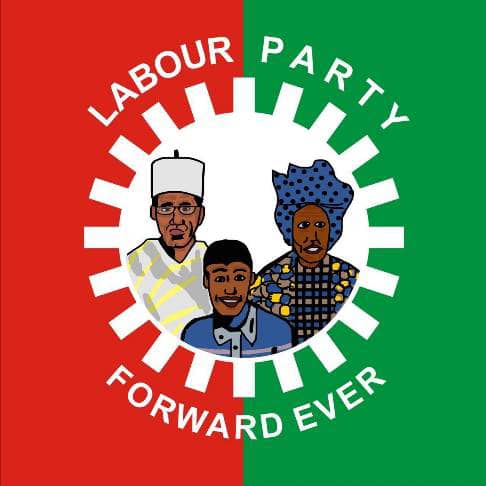
By Our Correspondent
The Labour Party Caucus in the House of Representatives has expressed disappointment and concern that the ruling All Progressives Congress (APC) is prioritizing 2027 politics over the welfare and security of Nigerians, labeling it insensitive, unconscionable and a clear example of questionable leadership.
They emphasized that while the President’s aspiration for re-election is legitimate, his priority should be addressing the pressing challenges facing Nigerians.
In a statement issued by the Labour Party Caucus Leader, Hon. Afam Victor Ogene, in Abuja on Sunday, the lawmakers reiterated that the primary duty of a government is to ensure the welfare and security of its citizens. However, they criticized the APC and President Bola Tinubu for prioritizing their 2027 reelection bid over these fundamental responsibilities. The statement expressed concern and bewilderment that while the nation grapples with insecurity, the ruling party is either ignoring the issue or offering superficial solutions rather than addressing the problem effectively.
These concerns were raised amid escalating insecurity nationwide and the administration’s struggles to fund budgets and demonstrate accountability. “The situation has led to prolonged protests by local contractors who remain unpaid for completed projects, sparking economic hardship, stalled development, and a dearth of new projects.”
Recently, these aggrieved contractors have been holding vigils outside the Ministry of Finance, highlighting the government’s shortcomings.
The Labour Party representatives highlighted that the “Appropriation Act, a law governing budget allocation, has been consistently disregarded by the current administration.” They pointed out the irony of the government pursuing costly projects like the controversial multi-trillion naira coastal road without proper appropriation or procurement processes, while essential federal road infrastructure lies in disrepair. This has raised concerns among citizens, particularly those planning to travel during the festive season, who face not only difficult road conditions but also heightened insecurity.
Also of grave concern is the opaque expenditure of N17.5 trillion, in 2024 alone, on a pipeline-security contract, as revealed in the recently audited accounts of the Nigerian National Petroleum Company, NNPC.
“Nigerians would remember that over a 12-year period, the country spent about N18 trillion on subsidy(which benefitted everyone through affordable transportation and cheaper costs of foodstuffs), but on the excuse of lack of funds to sustain the subsidy regime, this Administration has clearly robbed Peter(Nigerians), to pay Paul(cronies), through a questionable pipeline-security contract whose executors are unknown.”
This statement paints a grim picture of Nigeria’s current state, highlighting concerns about the effectiveness of its government branches. “The executive is seen as underwhelming, the judiciary’s decisions are questioned, and the legislature is criticized for not having the moral fiber to hold the executive accountable.
“Our dear country, Nigeria has become a special economic zone: everyone and everything now has a price. Kidnappers and bandits now have prices on the heads of the citizenry; elected officials now have a price to look the other way; and opposition figures have prices to enthrone chaos in their own platforms. Even the clergy and ulamas are not spared the chicanery of the divisive effects of a gravely monetized polity.
“Pray, Nigerians, we’re in the 12th month of the year, 2025. In fact, across government owned enterprises, ministries, departments, and agencies of government, none can boast of 10 percent of execution of the capital component of the budget. In most cases, the scorecard reads nil.
“Yet everyone carries on, as though this has become the new normal.
Worse is the glaring impunity of relevant officials not bothering to explain to anyone where revenues meant for the implementation of the budget have ‘disappeared’ to.
“Nigeria is on a negative cruise; local contractors occupying the offices of the Federal Ministry of Finance, retired police officers taking over the gates of the National Assembly, while kidnappers freely choose where to strike every single day, yet the only response by government is to launch and distribute vehicles for a purported Renewed Hope Agenda.
So, while the country sits on the precipice, all Mr. President thinks about is to return to power in 2027.
“Mr. President, while your quest is a legitimate aspiration, please do well to attend to the current stark realities confronting Nigerians.
Besides the parlous state of Nigerian roads – which now ensures that a hitherto six hours journey, from either Lagos or Abuja to the South South or South East, now takes an entire day to traverse – is the grim reality of possible kidnap which stares every road user in the face.
“Some lawmakers are reflecting on their roles and acknowledging that many are complicit, silenced by potential pecuniary gains. Many have described the 10th Assembly as the worst in Nigeria’s democratic history, reduced to puppetry and rubber-stamping, with no tangible benefits for citizens. They criticize the government for prioritizing economic interests over citizens’ welfare, labeling it “economic banditry.”
“We must not continue on this sorry path. Both the ruling party and opposition must put aside politics and prioritize the people’s welfare. Citizens are the backbone of democracy, and their interests should come above all else.”
Politics
Rivers Assembly Speaker, 16 others dump PDP for APC
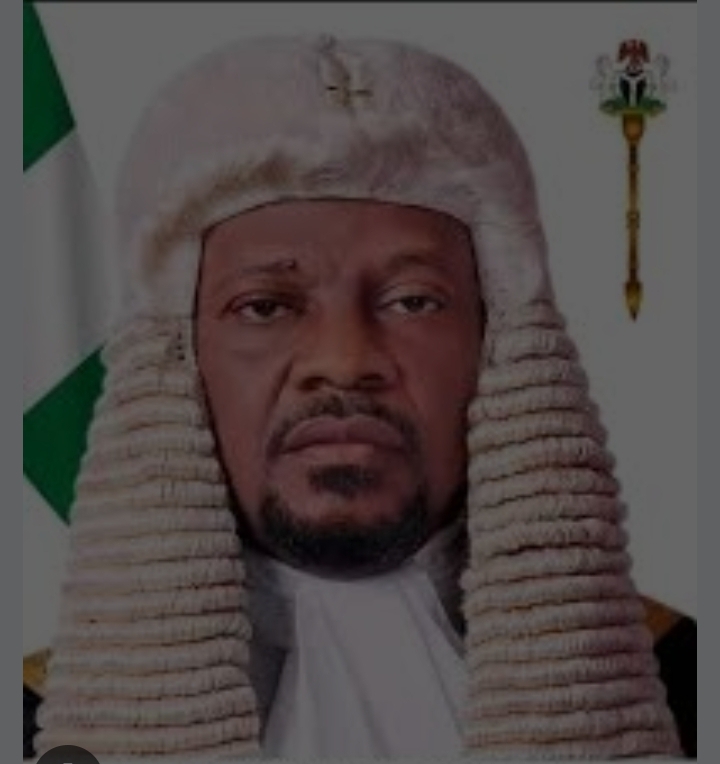
By Our Correspondent
Seventeen members of the 10th Rivers State House of Assembly, on Friday, defected from the Peoples Democratic Party (PDP) to the All Progressive Congress (APC).
The lawmakers announced their defection during plenary on Friday, December 5, 2025 at the Auditorium of the Assembly quarters currently used as the hallowed chambers.
The defected lawmakers, led by Speaker of the House, Martin Amaehwule, cited the division in the PDP at the national level as the reason for their defection, noting that the situation has made the future of the party “hazy and nebulous”.
Among the lawmakers who defected to the All Progressive Congress were; the Speaker, Martin Amaewhule, Deputy Speaker, Dumle Maol, Majority Leader, Major Jack, Deputy Majority Leader, Linda Somiari- Stewart, Chief Whip, Hon. Frankline Nwabuchi, and the Deputy Whip, Hon. Ofiks Kabang.
Others are; Hon. Peter Abbey, Smart Adoki, Igwe Aforji, Arnold Davids, Enemi George, Tekenari Granville, Christian Nwankwo, Gerald Oforji, Azeru Opara, Lolo Opuende, and Hon. Solomon Wami.
Recall that the Speaker, Martin Amaehwule had in December 2023, in the heat of the over two years political crisis in the state, led all 27 members of the Assembly loyal to the FCT Minister to the APC but later denied their defection, and returned to the PDP.
Meanwhile, the PDP which is now the minority party in the House with 9 members, has constituted their officers with Hon. Sylvanus Nwankwo emerging the Minority Leader, Hon. Barile Nwakoh was elected Deputy Minority Leader, Hon. John Dominic Iderima, Minority Whip, and Hon. Justina Emeji, Deputy Minority Whip.
The Assembly has also renewed its earlier call on the State Governor, Sir Siminalayi Fubara to forward his list of Commissioner-nominees to the House for screening and confirmation in line with the 1999 Constitution; regretting that “the State is yet to have the complement of a full cabinet.”
The Assembly also reaffirmed its earlier resolution made on the 14th of December, 2023, and adopted the auditorium at the State House of Assembly quarters as its legitimate and lawful Chamber for the conduct of legislative businesses for the life of the Tenth Assembly of the State.
Speaker of the Assembly, Martin Amaehwule in his speech lauded President Bola Tinubu for his purposeful and exceptional leadership and pledged their support to the APC and the President.
Politics
Sulu – Gambari , Ita Enang , Dambazzau , Ibas Ibok -Ete, 61 others make Tinubu’s Ambassadorial list
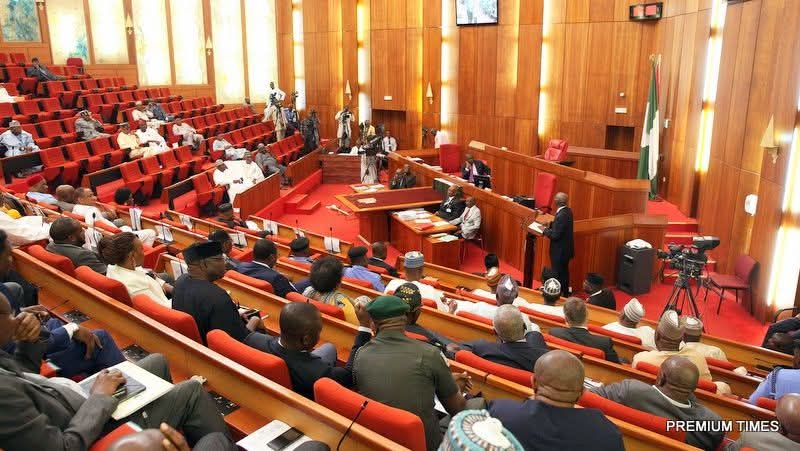
By George Mgbeleke
The Senate Thursday received requests for confirmation of nominations of 65 Ambassadorial nominees from President Bola Ahmed Tinubu.
The nominees as read from two different lists by the President of the Senate , Godswill Akpabio during plenary, fell into two categories of 34 Career Ambassadors and High Commissioners and 31 Non – Career Ambassadors and High Commissioners designate .
Notable names among the 34 Carrer Ambassadors and High Commissioners are Ambassador Sulu – Gambari Olatunji Ahmed from Kwara State , Ambassador Ahmed Mohammed Monguno from Borno State , Ambassador
Maimuna Ibrahim from Adamawa State etc .
Notable in the list of Non Career Ambassadors and High Commissioners are Senator Solomon Ita Enang from Akwa Ibom State , Vice Admiral Ibas Ibok – Ete from Cross River State , Ex Chief of Army Staff, Abdulrahaman Dambazzau from Kano etc .
President Tinubu in the requests hinged on section 171 sub section 1, 2 and 4 of the 1999 Constitution , sought for expeditious consideration of the nominees .
Accordingly, the President of the Senate, forwarded the requests to the committee on Foreign affairs for screening and report back within one week .
Recall that President Tinubu had earlier forwarded to the Senate , three ambassadorial nominees last week for appointment confirmation .
The three earlier nominees , namely
Kayode Are ( Ogun State), Aminu Dalhatu ( Jigawa) and Ayodele Oke ( Oyo State ), were screened on Wednesday by Senator Abubakar Sani Bello ( Niger North ) led committee .
Full list of the Ambassadorial nominees per state reads : ” Ambassador Ezenwa Chukwuemeka ( Abia ) Maimuna Ibrahim ( Adamawa ), Monica Ogochukwu ( Anambra) ,
Ambassador Mohammed Mahmoud Lele ( Bauchi) ,
Endoni Sindo ( Bayelsa) and Ambassador Ahmed Mohammed Minguno ( Borno ) .
Others are Jane Adams Okon Michael ( Cross River ), Clark Omeruo Alexandra ( Delta ), Chimma Geofrey Davies ( Ebonyi) ,
Oduma Yvonne Ehinose ( Edo State ), Wasa Segun Ige ( Edo State )
Ambassador Adeyemi Adebayo Emmanuel ( Ekiti ), Ambassador Onaga Ogechukwu Kingsley ( Enugu ) and
Magaji Umar ( Jigawa) .
Other nominees in the category of Career Ambassadors are
Mohammed Saidu Dahiru ( Kaduna ) ,
AbdulSalam Abus Zayat ( kano) ,
Shehu Barde ( Katsina ) , Aminu Nasiu ( Katsina ),
Abubakar Musa Musa ( Kebbi) ,Mohammed Idris ( Kebbi) ,
Bako Adamu Umar ( Kogi ) ,
Sulu Gambari Olatunji Ahmed ( Kwara ),
Ramata Mohammed ( Lagos ), Shaga John Shama ( Nasarawa )
Salau Hamza Mohammed ( Niger ) and Ibrahim Danlami ( Niger ) .
Others are
Adeola Ibrahim Mopelola ( Ogun) ,
Ruben Abimbola Samuel ( Ondo),
Akande Wahab Adekola ( Osun) ,
Adedokun Esther ( Oyo) ,
Gedagi Joseph John ( Plateau ) ,
Luther Obomode Ayokalata ( Rivers ),
Danladi Yakubu Yaku ( Taraba ) and
Bello Dogondaji ( ( Zamfara ) .
Names on the list of the 31 Non – career ambassadorial nominees are
Senator Grace Bent ( Adamawa ) , Senator Eta Enang ( Akwa – Ibom),
Nkechi Linda Okocha ( Anambra ),
Mahmud Yakubu ( Bauchi )
Philip K. Ikurusi ( Bayelsa ) ,
Paul Oga Adikwu ( Benue ),
Vice Admiral Ibok-Ette Ibas rtd ( Cross River ),
Hon. Abasi Braimah ( Edo ) and
Erelu Angela Adebayo Ekiti )
Others are Barrister Olumilua Oluwayimika Ayotunwa ( Ekiti ),
Rt. Hon. Ifeanyi Ugwuanyi ( Enugu State ) ,
Barr. Mrs. Chioma Ohakim ( Imo State ),
Lt. Gen. Abdulrahman Bello Dambazau (rtd.) ( Kano State ),
Hon. Tasiu Musa Maigari ( Katsina ) ,
Alhaji Abubakar Sanusi Aliyu ( Kogi) and
Olufemi Pedro ( Lagos State ) .
Others are
Barr. Mohammed Ubandoma Aliyu ( Nasarawa ),
Senator Jimoh Ibrahim ( Ondo), Ambassador Joseph Sola Iji ( Ondo ),
Fani-Kayode ( Osun ) , Professor O. Adewole ( Osun) , Florence Ajimobi ( Oyo ), Lola Akande ( Oyo), Professor Nora Ladi Daduut ( Plateau) , Yakubu N. Gambo ( Plateau ) , Chukwujinka Okocha ( Rivers ) , Haruna Abubakar ( Sokoto ) , Rt Hon Jerry Samuel Manwe ( Taraba ) and Adamu Garba Talba Nangree ( Yobe State ) .
-

 Business & Economy4 months ago
Business & Economy4 months agoPC-NCG Issues Disclaimer on Purported Nigerian Coast Guard National Orientation Exercise In Anambra State
-

 Entertainment1 year ago
Entertainment1 year agoJubilation galore as Parishioners of CKC Kurudu celebrate their cultural heritage ….FG should exploit our Cultural heritage to unite Nigerians-Rev Fr Dim
-

 Law & Crime6 months ago
Law & Crime6 months agoICPC pledges to collaborate with FIDA to end Sex for Marks in tertiary institutions
-

 General News1 year ago
General News1 year agoCelebration galore as UDA Successfully Elected New Exco ……I will digitalize processes that will raise UDA to greater height -Comr. Okejiri
-

 General News2 years ago
General News2 years agoReps hold public hearing on FMC Ugwuaji Awkunanaw
-

 Law & Crime5 months ago
Law & Crime5 months agoLegal practitioner raises alarm over threat to his life by CSP Muhammed Abdulkareem
-

 General News1 year ago
General News1 year agoKugbo Hill Tragedy: Trailer Crushes Car, Kills Four and Injures Several Others in Abuja
-

 Politics3 months ago
Politics3 months agoASUU-NDU protest against FG loans, unpaid salaries,Non-Implementation of agreements …..says loans is generational slavery



